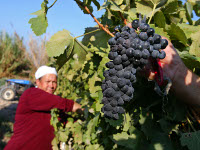Registration
You will receive an email confirming your registration.
IMGXYZ2322IMGZYXFood security is fast becoming a critical issue for countries in the Persian Gulf, many of whom face tighter global food markets because of trading partners’ strained export surpluses, a decline in domestic food production, and population growth. Wealthier countries on the Arabian Peninsula, fearing that some day they might not be able to secure enough food for their populations, have increased government subsidies, built up strategic storage, and invested in agriculture overseas.
Eckert Woertz, of the Gulf Research Center in Dubai, discussed the Gulf food security predicament and evaluated the current initiatives of the Gulf Cooperation Council countries. He was joined by the Council on Foreign Relations’ Thomas Lippman, who commented on Saudi Arabia’s controversial "food security initiative," which aims to produce food in underdeveloped countries for consumption by the fast-growing population of Saudi Arabia. Carnegie’s Christopher Boucek moderated.
The Problems
According to Woertz, food security in the Gulf increased in importance in 2009, as the world saw a big commodity boom and food cost hikes, coupled with an increase in export restrictions by trading partners. Even as the cost of food supply from outside the region rose, local supply has been falling and regional demand has been rising.
- Demand: 60 percent of food is already being imported in the Gulf. Meanwhile, the population of the Gulf is increasing; between 2000 and 2030, it is expected to double.
- Local Supply: Water used for irrigation comes from ancient aquifers and is non-renewable. Saudi Arabia, for example, was a net wheat exporter in the 1980s and 1990s, but it cannot sustain its irrigation. By 2060, the desert will have reclaimed the farmland where wheat was once grown.
- Costs of Imports: There has been a rise in export restrictions on food by major trade partners, who are concerned about their own food security.
The Solutions
Gulf nations have sought to stimulate food production in countries that have sufficient water and irrigable land, to support the growing Gulf population. Countries hosting Gulf investments range from Sudan, Pakistan, and Ethiopia, to the Philippines, Kazakhstan, Thailand, and Tanzania. In these nations, Gulf countries have generally purchased land and provided the capital to increase food production using the host countries natural resources.
The Gulf countries now depend on four main sources for food production:
- The new initiatives in developing countries, where Gulf nations can use their investment abilities more aggressively. Woertz referred to these sources as having the classical colonial agro-export and food import dependencies.
- Emerging developing countries, such as Brazil, South Africa, Thailand, Argentina, who cannot afford to subsidize their national agriculture and are therefore at a disadvantage when selling to global markets.
- Large suppliers that subsidize food production within their own borders, such as the United States and the European Union.
- Production within their own borders.
The available water sources in the Gulf are limited. Woertz pointed to an article in Foreign Policy that suggested that the initiatives to buy land in underdeveloped countries are in fact attempts to purchase water resources, not land resources. He warned that what is happening on the ground is not clear; the full motives of the Gulf investors cannot yet be determined.
Saudi Arabia
Lippman assessed the agricultural sector in Saudi Arabia, as well as the Saudi perspective on the drive for agro production in other countries. He described how the socio-political problem of inflation, coupled with food shortages and drought, has spooked the Saudi government and led to changes in their agricultural policies.
One significant new policy has been a food security initiative, where Saudi industries would use their capital to bring resources and technology to countries that can’t afford them. The Saudi government argues that the relationship benefits both parties; if Saudi investors quintuple the food output of these countries, the host country would have more agriculture revenue and food for itself and they could increase exports to Saudi Arabia. The Saudi government compares the venture to the West’s investment in oil. Lippman explained that the initiatives are actually joint ventures between the host governments and private sector Saudi Arabian organizations.
Potential Issues with Food Security Initiatives
- Woertz pointed out that there has been some opposition to these initiatives within potential host countries. Thailand has declared that there would be no land sales to the Gulf countries, and farmers in Kenya and Pakistan have voiced opposition to the proposed deals with Gulf countries.
- Lippman described the potential for conflict over scarce resources outside the Gulf. International tension might occur, for example, if Saudi Arabia, Kuwait, or the UAE sought to build large agro-projects in Sudan, which shares its water source, the Nile, with Egypt.
- Tensions might also occur between agricultural producers within the Gulf and their own governments. Saudi Arabia, which has long been proud of its food production self-sufficiency, is a prime example of this potential area for conflict. Agriculture is a big business in Saudi Arabia. There are huge agricultural projects in the deserts, where the Saudis grow alfalfa and vegetables and maintain dairy farms. In 2000, 5 percent of Saudi Arabia’s GDP and 12 percent of its labor went towards agriculture. Strong elements within Saudi Arabia oppose the new food security initiatives. These elements are either agro-business entrepreneurs who believe that the country should significantly increase its local investment, or others who worry about the risk, wondering who would ensure the ensuing contracts with other governments.
